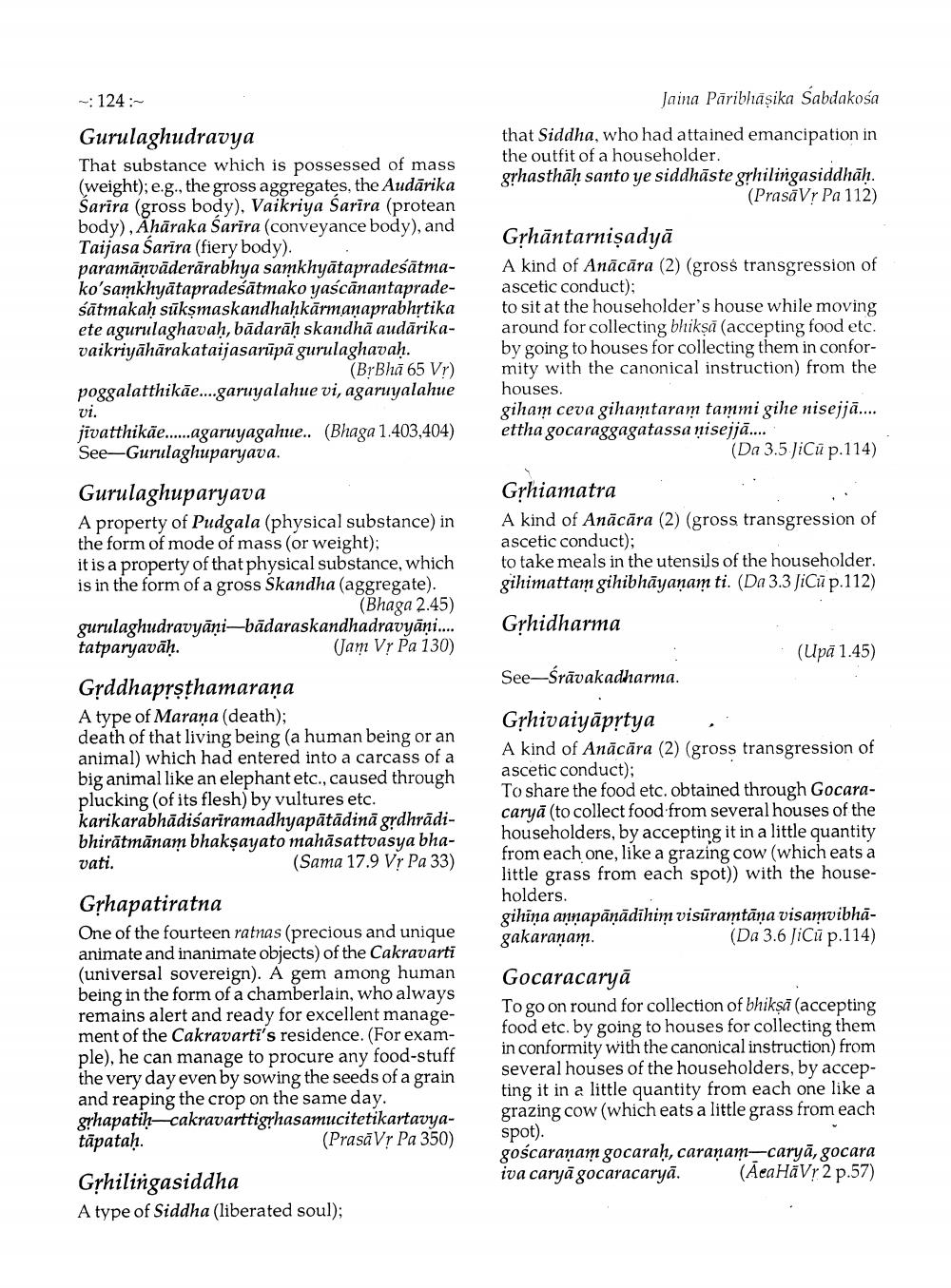________________
Jaina Pāribhäșika Sabdakosa
that Siddha, who had attained emancipation in the outfit of a householder. grhasthāh santo ye siddhāste gļhilingasiddhāḥ.
(PrasãVPa 112)
- 124:Gurulaghudravya That substance which is possessed of mass (weight); e.g., the gross aggregates, the Audārika Sarira (gross body), Vaikriya Sarira (protean body), Ahāraka Sarira (conveyance body), and Taijasa Sarīra (fiery body). paramāṇväderārabhya samkhyātapradeśātmako'samkhyātapradeśātmako yaścānantapradeśātmakah sūkşmaskandhaḥkārmaņaprabhịtika ete agurulaghavah, bādarāh skandhā audārikavaikriyāhārakataijasarūpā gurulaghavaḥ.
(BrBhā 65 Vr) poggalatthikāe....garuyalahue vi, agaruyalahue
Grhāntarnişadya A kind of Anācāra (2) (gross transgression of ascetic conduct); to sit at the householder's house while moving around for collecting bhikṣā (accepting food etc. by going to houses for collecting them in conformity with the canonical instruction) from the houses. giham ceva gihamtaram tammi gihe nisejjā.... ettha gocaraggagatassa nisejjā....
(Da 3.5 JiCū p.114)
vi.
jivatthikāe......agaruyagahue.. (Bhaga 1.403,404) See-Gurulaghuparyava.
Grhiamatra A kind of Anācāra (2) (gross transgression of ascetic conduct); to take meals in the utensils of the householder. gihimattam gihibhāyaṇam ti. (Da 3.3 JiCū p.112)
Grhidharma
(Upā 1.45)
Gurulaghuparyava A property of Pudgala (physical substance) in the form of mode of mass (or weight); it is a property of that physical substance, which is in the form of a gross Skandha (aggregate).
(Bhaga 2.45) gurulaghudravyāņi—bādaraskandhadravyāņi.... tatparyavāḥ.
(Jam Vr Pa 130) Grddhaprşthamarana A type of Maraņa (death); death of that living being (a human being or an animal) which had entered into a carcass of a big animal like an elephant etc., caused through plucking (of its flesh) by vultures etc. karikarabhādiśarīramadhyapātādinā gydhrādibhirātmānam bhakşayato mahāsattvasya bhavati.
(Sama 17.9 VỊ Pa 33)
See-Śrāvakadharma.
Grhivaiyāprtya A kind of Anācāra (2) (gross transgression of ascetic conduct); To share the food etc. obtained through Gocaracaryā (to collect food from several houses of the householders, by accepting it in a little quantity from each one, like a grazing cow (which eats a little grass from each spot)) with the householders. gihiņa annapāņādihim visūramtāņa visamvibhāgakaraṇam.
(Da 3.6 JiCu p.114)
Gshapatiratna One of the fourteen ratnas (precious and unique animate and inanimate objects) of the Cakravarti (universal sovereign). A gem among human being in the form of a chamberlain, who always remains alert and ready for excellent management of the Cakravarti's residence. (For example), he can manage to procure any food-stuff the very day even by sowing the seeds of a grain and reaping the crop on the same day. grhapatih-cakravarttigrhasamucitetikartavyatāpataḥ
(PrasāVPa 350)
Gocaracaryā To go on round for collection of bhikṣä (accepting food etc. by going to houses for collecting them in conformity with the canonical instruction) from several houses of the householders, by accepting it in a little quantity from each one like a grazing cow (which eats a little grass from each
spot).
goścaraṇam gocarah, caraṇam-caryā, gocara iva caryā gocaracaryā. (AeaHaVr 2 p.57)
(ACH
Gļhilingasiddha A type of Siddha (liberated soul);




